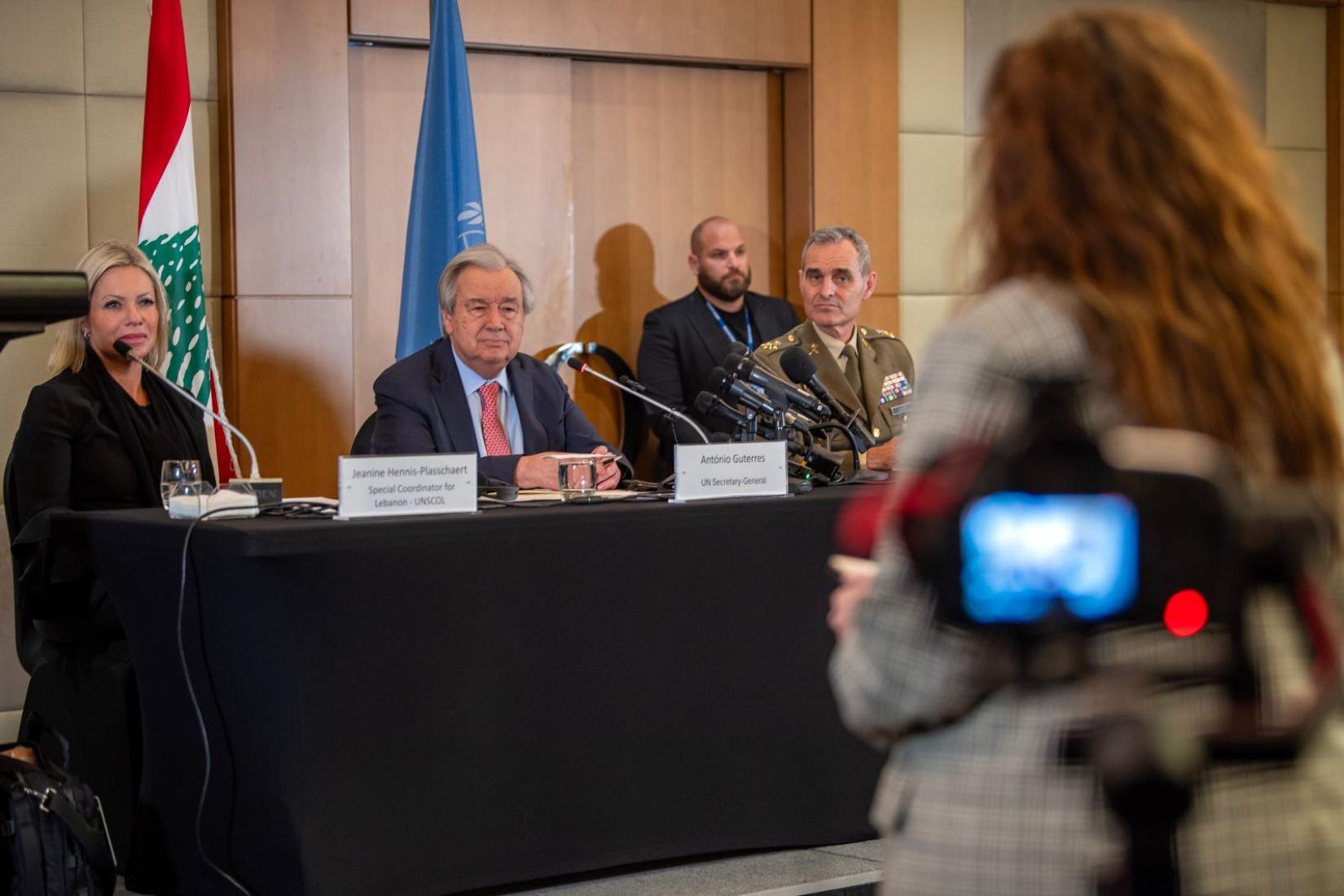UN Secretary-General Remarks to the Press in Lebanon
The following are the full remarks of the UN Secretary-General Antonio Guterres at the Press Conference held at the Movenpick Hotel, in Beirut, Lebanon.
Ladies and gentlemen of the press,
I am concluding a very meaningful and productive visit to Lebanon. I have been profoundly moved by all I saw and heard.
Throughout my time here, I have sensed an atmosphere of opportunity.
After one of the most difficult years in generations, Lebanon is on the cusp of a more hopeful future.
A window has opened paving the way for a new era of institutional stability, a State fully able to protect its citizens, and a system that would allow the tremendous potential of the Lebanese people to flourish.
We must do all we can to make this vision a reality.
That was the focus of my meetings with President Joseph Aoun, caretaker-Prime Minister Najib Mikati, Speaker of Parliament Nabih Berri, Prime Minister-designate Nawaf Salam and caretaker-Foreign Minister Abdallah Bou Habib.
With a head of state, and government, once formed, Lebanon will be placed to address the needs of its people and extend state authority throughout its territory.
Of course, big challenges lie ahead.
During my visit in the South yesterday, I saw firsthand the dramatic human impact and the utter level destruction caused by the conflict.
Hundreds of thousands of displaced residents have returned to southern Lebanon, southern Beirut, the Bekaa Valley, and elsewhere.
Many have found their homes and communities in ruin.
The rebuilding needs are great. But they are not insurmountable.
Working hand-in-hand with Lebanese authorities and partners, the United Nations will intensify our support for recovery and reconstruction across Lebanon.
Many Israelis were also victims, with their lives upended by the conflict.
I fervently hope that, from both sides, people will soon be able to return to the areas where they lived and resume their daily lives.
Ladies and gentlemen,
The cessation of hostilities is fragile, but it is holding.
I call on both parties, and all those with influence, to ensure commitments are realized.
The newly established mechanism should be used to address outstanding issues.
I note that the Israel Defense Forces have commenced their phased withdrawal from Lebanese territory, with the Lebanese Armed Forces deploying in greater numbers south of the Litani River.
But we see continued demolitions of buildings and infrastructure in southern Lebanon, as well as (fatal) airstrikes.
On the other hand, in the past 40 days alone, UNIFIL peacekeepers uncovered over a hundred unguarded weapons and ammunition caches, promptly sharing their locations with the Lebanese Armed Forces.
Resolution 1701 is clear: The area between the Blue Line and Litani River must be free of all armed personnel, assets and weapons -- other than those of the Government of Lebanon and UNIFIL.
I had the opportunity to visit UNIFIL troops yesterday who are undertaking a vital mission.
They carried out over 730 missions in close cooperation with the Lebanese Armed Forces, facilitating their redeployment to more than 50 positions.
UNIFIL has also facilitated 39 humanitarian missions -- in coordination with the Lebanese Armed Forces, the Lebanese Red Cross, various UN entities, and NGOs.
Our Peacekeepers are currently strengthening their capacities and adapting their conduct of operation, within their mandate.
Despite continued challenges, critical milestones can be met with sufficient political will. Safety, security and freedom of movement of UNIFIL should be fully guaranteed.
The parties have renewed their commitment to resolution 1701 as the framework for lasting peace.
As I said, it is now essential to see the withdrawal of the Israeli Defense forces from Lebanese territory and the simultaneous deployment of the Lebanese Armed Forces across southern Lebanon as agreed.
Moreover, Lebanon’s sovereignty and territorial integrity must be respected, and the Lebanese state must have full control of weapons throughout Lebanese territory.
This is a central tenet of resolution 1701.
It is therefore equally important to also look beyond the 60-day-period, in order to begin the tough discussions on how resolution 1701, this time around, will be implemented on both sides of the Blue Line, and, in Lebanon, beyond both banks of the Litani river.
I encourage the international community to strengthen support to the Lebanese Armed Forces.
The United Nations -- including through the UN Special Coordinator for Lebanon and UNIFIL -- is committed to supporting the parties uphold their obligations under resolution 1701 and ensuring that the cessation of hostilities holds.
This would lay a platform for the full implementation of the resolution and its ultimate goal, a permanent ceasefire between Lebanon and Israel.
I want to once again salute the women and men of UNIFIL who remained in position, at great risk to their safety and security.
I also extend my profound thanks to the troop-contributing countries. They were crucial in helping the parties find their way towards peace.
I also want to thank and recognize all UN staff in Lebanon, for their courage and resilience, and continuing to deliver under at great personal risk under difficult circumstances. Several made the ultimate sacrifice and many all they had.
Ladies and gentlemen,
Finally, the situation in the region is evolving rapidly, with a deal on a ceasefire and release of hostages in Gaza, as well as developments in neighboring Syria.
I want to commend the Government and people of Lebanon for their longstanding solidarity in hosting large numbers of Syrian and Palestine refugees.
It is that spirit of solidarity that the world must show to the people of Lebanon.
The road ahead is filled with promise but also great tests. These include reforms and efforts for greater accountability.
As the Lebanese people travel this road together, the United Nations is proud to stand with you.
Let’s make the most of this atmosphere of opportunity.
Thank you.


